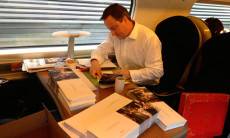September 18, 2015
What Robert Frost can teach us about the changing workplace
 The great Twentieth Century American poet Robert Frost is arguably best known these days for two quotations that have – usually in bastardised versions – entered into common usage. The first is the final verse of his poem The Road Not Taken, and especially the final three lines: “Two roads diverged in a wood, and I /I took the one less traveled by, / And that has made all the difference.” The second is a quotation: “The brain is a wonderful organ; it starts working the moment you get up in the morning and does not stop until you get into the office”; which should be pinned up in every reception area and is usually rendered as something like ‘when you get to work, don’t leave your brain at the door.’ Both come to mind when you read something like the report entitled ‘Next Generation Working Life’ from Ericsson’s Networked Society Lab.
The great Twentieth Century American poet Robert Frost is arguably best known these days for two quotations that have – usually in bastardised versions – entered into common usage. The first is the final verse of his poem The Road Not Taken, and especially the final three lines: “Two roads diverged in a wood, and I /I took the one less traveled by, / And that has made all the difference.” The second is a quotation: “The brain is a wonderful organ; it starts working the moment you get up in the morning and does not stop until you get into the office”; which should be pinned up in every reception area and is usually rendered as something like ‘when you get to work, don’t leave your brain at the door.’ Both come to mind when you read something like the report entitled ‘Next Generation Working Life’ from Ericsson’s Networked Society Lab.



















January 12, 2016
A cynic’s field guide to workplace terminology, part three 0
by Simon Heath • Comment, Facilities management, Technology, Workplace, Workplace design
(more…)